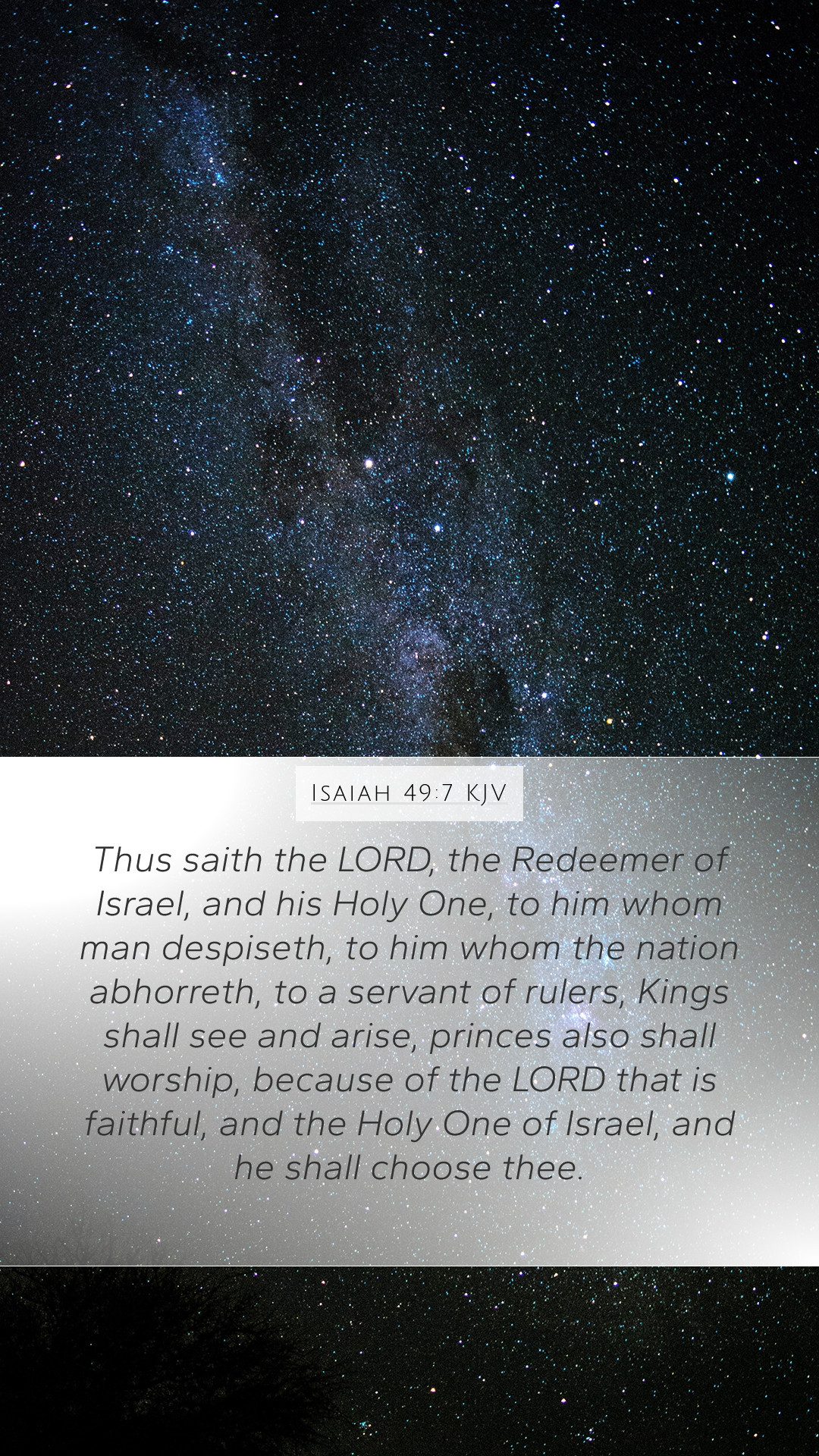Understanding Isaiah 49:7
Verse: “Thus says the Lord, the Redeemer of Israel, their Holy One, to him whom man despises, to him whom the nation abhors, to the servant of rulers: ‘Kings shall see and arise, princes, and they shall worship, because of the Lord who is faithful, the Holy One of Israel, and He has chosen you.’”
Bible Verse Meaning
Isaiah 49:7 presents a powerful message from God regarding His chosen servant, often identified with Israel but ultimately fulfilled in Christ. This verse encapsulates the tension between divine choice and human rejection, shedding light on the overarching themes of redemption and exaltation that run throughout the book of Isaiah.
Bible Verse Interpretations
According to various public domain commentaries:
- Matthew Henry: Henry emphasizes that the Lord reassures His servant that despite being despised by men, he holds a place of honor in God's plan. The mention of "kings and princes" reflects the eventual acknowledgment of God's servant by those in positions of power.
- Albert Barnes: Barnes focuses on the servant's mistreatment by the nations, which foreshadows the rejection of Christ. However, the eventual worship by rulers underscores the significance of divine purpose being realized, demonstrating that God’s faithfulness leads to ultimate vindication.
- Adam Clarke: Clarke presents the idea that the servant here represents both Israel and Christ, illustrating the double application of this prophecy. Clarke remarks on the servant’s relationship with the rulers and how despite earthly disdain, divine honor will be bestowed.
In-depth Commentary on Isaiah 49:7
This verse falls within a larger context where Isaiah prophesies about Israel’s mission, their struggles, and God’s promises to them. It touches on pivotal themes such as:
- Rejection and Acceptance: The servant experiences scorn, reflecting how messengers of God, including Christ, often face opposition despite their divine purpose.
- God’s Sovereignty: The assurance that God has chosen His servant indicates the sovereignty of His plans that transcend human judgment.
- Divine Exaltation: The future recognition by kings portrays a reversal of fortunes, where the humble servant is elevated in God’s timing.
Key Themes in Isaiah 49:7
- Faithfulness of God: “Because of the Lord who is faithful” highlights God’s unchanging nature and how He honors His commitments.
- Chosen Identity: The remark “He has chosen you” signifies that even in trials, the servant is set apart for a greater purpose.
- Impact of the Servant: The implications of the servant’s role extend beyond Israel, indicating a broader theological significance for the world.
Bible Study Insights
This verse can serve as a focal point for Bible study groups and can be examined through various lenses:
- How to interpret Bible verses: Understanding the duality of Israel and Christ as the servant.
- Historical context of Bible verses: Exploring the socio-political environment of Isaiah’s time and its relevance to the New Testament.
- Applying Bible verses to daily life: Reflecting on personal experiences of rejection and recognizing God’s faithfulness amidst challenges.
Cross References
Isaiah 49:7 resonates with several other biblical passages that echo its themes:
- Isaiah 53:3: “He was despised and rejected by men; a man of sorrows, and acquainted with grief...” - Connecting to the suffering servant motif.
- Matthew 2:6: “But you, Bethlehem, in the land of Judah, are by no means least among the rulers of Judah...” - Linking to Jesus’ humble beginnings and eventual recognition.
- Philippians 2:9-11: “Therefore God exalted him to the highest place and gave him the name that is above every name...” - Enlightening the ultimate exaltation of Christ.
Conclusion
In summary, Isaiah 49:7 sets forth a profound testament to the complex relationship between God’s chosen servants and the world’s perception. The significance of this verse transcends the immediate context of Isaiah, providing valuable Bible study resources for understanding rejection, divine purpose, and the faithfulness of God. It stands as a beacon of hope that reassures believers of their value in God’s kingdom, even in the face of adversity.


